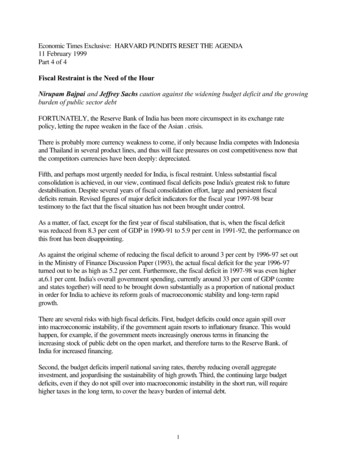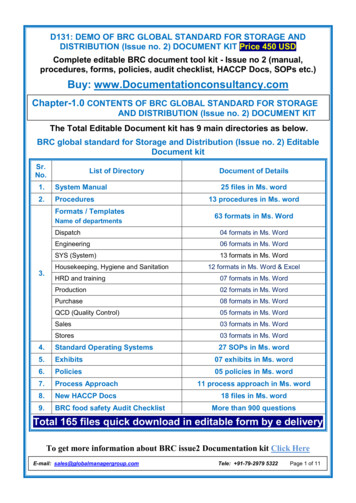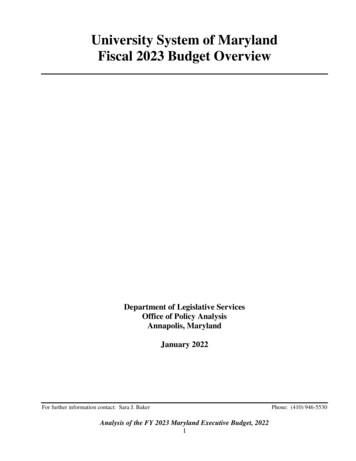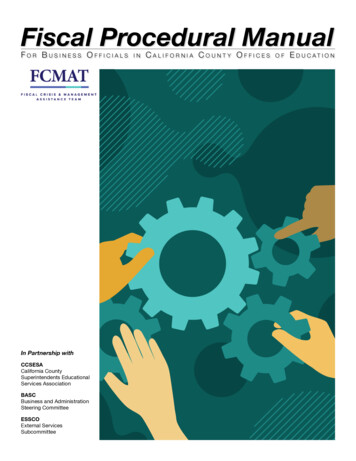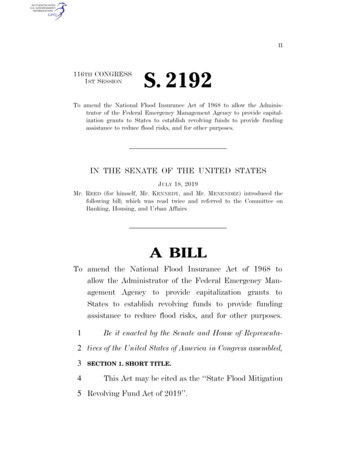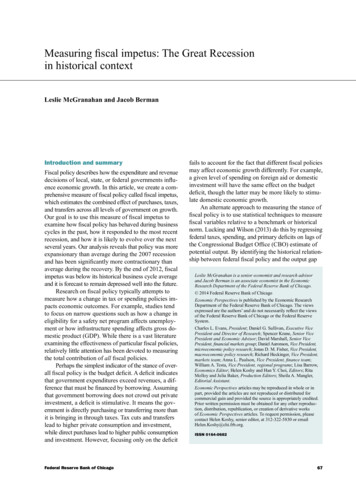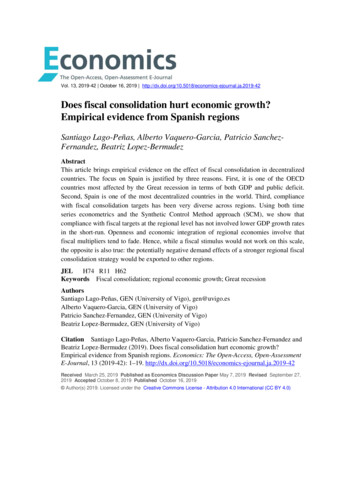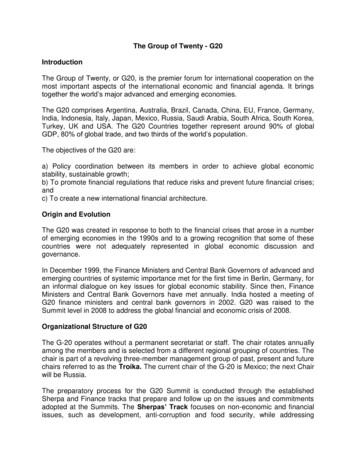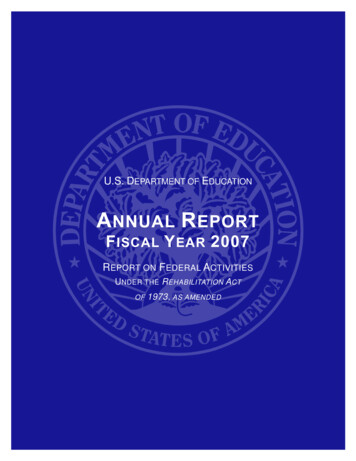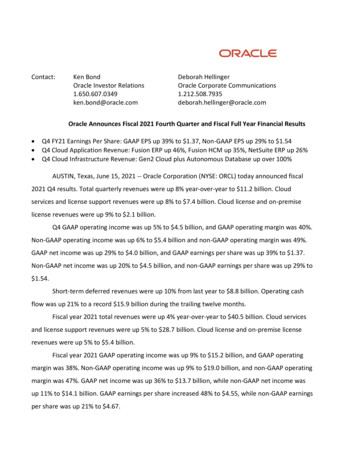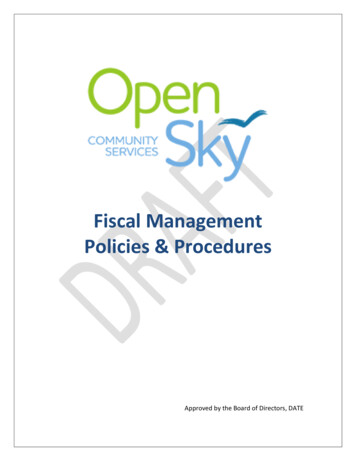
Transcription
Fiscal ManagementPolicies & ProceduresApproved by the Board of Directors, DATE
Open Sky Community Services: Fiscal Management Policies & ProceduresTable of ContentsAccounting Procedures .1Basis of Accounting . 1Journal Entries . 1Bank Reconciliations. 2Monthly Close. 2Recordkeeping . 3Internal Controls .4Lines of Authority . 4Conflict of Interest . 5Segregation of Duties . 5Physical Security . 5Financial Planning & Reporting .5Budgeting Process . 6Internal Financial Reports . 6Audit . 7Tax Compliance . 8Exempt Organization Returns . 8Quarterly/Annual Payroll Reports . 8Revenue & Accounts Receivable.8Accounts Receivable . 8Revenue Recognition. 9Donations . 9Cash Receipts. 10Deposits . 10Expense & Accounts Payable . 11Payroll . 11Fringe Benefits. 11Capital Procurement/Fixed Assets . 12Purchasing . 12Consultant/Independent Contractors . 13Accounts Payable . 14Program Advances/Petty Cash . 15Travel Expenses . 16Credit Cards . 16Expense Allocations . 17Asset Management . 17Investments . 17Short Term Investments . 19Fixed Assets . 20Line of Credit/Borrowing. 20Affiliate Relationships . 21Financial Risk Management. 22Financial Risk Management Plan . 22Insurance . 22Private Practice Counseling . 24
Open Sky Community Services: Fiscal Management Policies & ProceduresApproved by the Board of Directors, DATEAccounting ProceduresThis section covers basic accounting procedures for the agency. The accounting procedures usedby the agency shall conform to Generally Accepted Accounting Principles (GAAP) andGovernment Auditing Standards (GAS) to ensure accuracy of information and compliance withexternal standards.Basis of AccountingPolicy: The agency uses the accrual basis of accounting. The accrual basis is the method ofaccounting whereby revenue and expenses are identified with specific periods of time, such as amonth or year, and are recorded as incurred. This method of recording revenue and expenses iswithout regard to date of receipt or payment of cash. Also, as a federal grantee, the agencymust comply with federal guidelines pertaining to financial and compliance standards. Thesestandards are outlined in the OMB Compliance Supplement.Procedures:1. Throughout the fiscal year, expenses are accrued into the month in which they are incurred.The books are closed no later than the third Tuesday of the subsequent month. Invoicesreceived after closing the books will be counted as a current-month expense.2. At the close of the fiscal year, this rule is not enforced. All material expenses that should beaccrued into the prior fiscal year, are so accrued, to ensure that year-end financialstatements reflect all expenses incurred during the fiscal year. Material expenses aregreater than 5% of actual total revenue. Year-end books are closed no later than 60 daysafter the end of the fiscal year.3. All material revenue is recorded in the month in which it was earned or pledged. Materialrevenue is greater than 5% of actual total revenue.Journal EntriesPolicy: The review and approval of General Ledger (GL) journal entries is the responsibility of theVice President of Finance (VPF) and Senior Director of Accounting (SDA). Journal entries areeither created manually or are system generated. Manual journal entries are either entereddirectly or electronically imported into the accounting system’s GL.Procedures:1. System Generated Journal Entries: These entries are created automatically at regularlyscheduled time intervals determined by the Business Office to post the subsidiary ledgertransactions (Accounts Payable, Fixed Assets, and Receivables) or recurring journal entriesto the appropriate GL accounts.2. Manual Journal Entries: These entries are directly input into the GL or imported from anexcel template. They are reviewed and approved by the VPF or SDA.a) Standard Journal Entries: These entries are created at a regularly scheduled timeinterval by an Accounting staff and include such items as depreciation, insurance, andmanagement fee allocation. They are reviewed and approved by the VPF or SDA.b) Reclass entries: These entries are to move revenues or expenses between programs toappropriately allocate the items. Various Business Office staff may request suchreclassifications. These entries are prepared by the Accounting staff and reviewed andapproved by the VPF or SDA.Fiscal Policies & ProceduresPage 1
Open Sky Community Services: Fiscal Management Policies & ProceduresApproved by the Board of Directors, DATEc) Adjusting journal entries: These entries are prepared by the Accounting staff andreviewed and approved by the VPF or SDA.Bank ReconciliationsPolicy: All bank statements will be opened/downloaded and reviewed in a timely manner.Each bank account will be reconciled monthly and within 20 business days of the end of themonth. Any checks outstanding for longer than 6 months will be investigated. After aninvestigation of the outstanding check, a proper disposition of the check will be reached andimplemented.Procedures:1. Bank reconciliations are performed by a Business Office Staff assigned by the SDA.2. The bank reconciliation will reconcile the bank balance to the GL balance.3. A journal entry will need to be posted each month for items on the bank statements whichare not already recorded in the GL. These reconciling items may include: interest, servicecharges, NSF checks, direct deposits and other debit or credit memos.4. The bank reconciliation will include a listing of outstanding checks arranged in numericalorder and a listing of any deposits in transit.5. Bank reconciliations along with supporting documentation will be turned into the SDA forreview. Any discrepancies should be reported.6. Identify from the outstanding checklist and bank reconciliation any checks which have notbeen cashed for a minimum of 6 months.a) If possible, contact the recipient of the check to understand why it has not beencashed.b) If contact with the recipient is not possible, the check will be declared “void” andthe bank notified. The original account that was debited will be credited and cashwill be debited. If in the event, the payee cashes the check at a future time, theentry will be reversed.c) All disposition recommendations will be approved by the SDA.Monthly ClosePolicy: The books will be closed by the third Thursday of the subsequent month. Thestatements will be generated by either the VPF or SDA and reviewed by the VPF, VPCB, SDA andother Business Office staff.Procedures:1. The VPF and SDA will ensure all journal entries and invoices are entered into the accountingsystem prior to the monthly close.2. The bank reconciliations will be completed by the assigned Business Office staff prior to themonthly close.3. Once the statements are printed they will be reviewed by various Business Office staff toensure accuracy and completeness.4. Any discrepancies will be noted and will either be adjusted in the current or subsequentmonth at the discretion of the VPF.Fiscal Policies & ProceduresPage 2
Open Sky Community Services: Fiscal Management Policies & ProceduresApproved by the Board of Directors, DATERecordkeepingPolicy: The agency is required by law to maintain all appropriate records in accordance withfederal and state guidelines. Records are available on an as needed basis and availability issubject to confidentiality limitations. Records are retained in accordance with AAF CPAs RecordRetention Program.Procedures:1. The Vice President of Human Resources (VPHR) is responsible for staff records. The Payrolland Benefit Administrators have access to the payroll and benefits portion of the personnelfile. An employee and his/her manager have access to his/her file upon request.2. The VPF is responsible for financial records.3. The President/CEO or designee is responsible for legal and executive records4. For electronic records, system users will be issued password commensurate with theinformation they are privileged to access.5. Certain financial information and personnel files are to be stored electronically in theDocstar filing system.6. Document Destruction timeline:Type of DocumentMinimum RequirementFinance DocumentsAccident reports/claims7 yearsAccounts payable invoices, ledgers, schedules7 yearsAccounts receivable ledgers, schedules7 yearsActuarial reportsPermanentlyAudit reportsPermanentlyBank reconciliations3 yearsBank statements7 yearsBudgets – projections2 yearsCashbooksPermanentlyChart of accountsPermanentlyChecks (see exception below)7 yearsChecks (for important payments and purchases)PermanentlyContracts, mortgages, notes, leases (expired)7 yearsContracts, mortgages, notes, leases (still in effect)PermanentlyCorrespondence (with customers and vendors)2 yearsDeeds, mortgages, bills of salePermanentlyDepreciation schedulesPermanentlyDuplicate deposit slips2 yearsEmployee expense records3 yearsExpense analyses/expense distribution schedules7 yearsExpense reports7 yearsFinancial statements (year-end)PermanentlyGeneral/private ledgers, year-end trial balancesPermanentlyIRS determination/approval lettersPermanentlyInsurance policies (expired)3 yearsInsurance records, current accident reports, claims,Permanentlypolicies, etc.Fiscal Policies & ProceduresPage 3
Open Sky Community Services: Fiscal Management Policies & ProceduresApproved by the Board of Directors, DATEInternal audit reportsInternal reports (misc.)Inventories of products, materials, and suppliesInvoices of propertyInvoices to customer, from vendorsJournals – all typesPetty cash vouchersProperty appraisals by outside appraisersProperty records including costs, year-end trial balance,depreciation schedules, blueprints, plansPurchase invoicesPurchase orders (except purchasing dept copy)Purchase orders (purchasing dept copy)Rep payee financial recordsSubsidiary ledgersTax returns and worksheetsTimesheetsVouchers for payments to vendors, employees, etc.Withholding tax statementsHuman Resource DocumentsEmployment applicationsGarnishmentsPayroll records and summariesPersonnel files (terminated employees)Retirement and pension recordsTraining manualsExecutive DocumentsArticles of incorporationBylawsCorrespondence (general)Correspondence (legal and important matters)Directives – executiveMinute books of directors, bylawsPatents and related papersProcedure recordsSystem recordsTrademark registrations and copyrights3 years3 years7 yearsPermanently7 yearsPermanently3 yearsPermanentlyPermanently7 years1 year7 years2 years7 yearsPermanently7 years7 years7 years7 years7 years7 years7 yearsPermanentlyPermanentlyPermanentlyPermanently2 ermanentlyPermanentlyPermanentlyInternal ControlsThe agency employs several safeguards to ensure that financial transactions are properlyauthorized, appropriated, executed and recorded.Lines of AuthorityPolicy and Procedures:Fiscal Policies & ProceduresPage 4
Open Sky Community Services: Fiscal Management Policies & ProceduresApproved by the Board of Directors, DATE1. The Board of Directors approve the annual budget. Expenses are approved by designatedstaff in the Business Office. See detailed approval levels in the Purchasing and CapitalProcurement sections of this document.2. Board approvals are documented in the minutes. Expense approvals are documented withsignatures on invoices and the PO log book.3. Financial staff with the EVP/CFO develop fiscal policies and suggest amendments to theFinance Committee to recommend to the Board of Directors for approval.4. Policies are reviewed annually. Any changes are brought to the Finance Committee torecommend to the Board of Directors for approval.Conflict of InterestPolicy: All employees and members of the Board of Directors are expected to use goodjudgment, to adhere to high ethical standards, and to act in such a manner as to avoid anyactual or potential conflict of interest. A conflict of interest occurs when the personal,professional, or business interests of an employee or Board member conflict with the interestsof the agency. Both the fact and the appearance of a conflict of interest should be avoided. SeeBoard Policy Manual for complete Conflict of Interest Policy.Segregation of DutiesPolicy: The agency’s financial duties are distributed among multiple people to help ensureprotection from fraud and error. The distribution of duties aims for maximum protection of theagency’s assets while also considering efficiency of operations.Procedures:1. Check signers will not be involved in cash reconciliations.2. The receptionist will open all checks received.Physical SecurityPolicy: The agency maintains physical security of its assets to ensure that only people who areauthorized have physical or indirect access to money, securities, real estate and other valuableproperty.Procedures:1. Blank checks are stored in the safe closet. Only certain Business Office/HR staff will haveaccess.2. Cash and checks are stored in the safe in the safe closet. Only certain Business Office staffhave the combination. Bank deposits are made at least weekly.3. Passwords are used to access Business Office staff computers and the accounting system.Financial Planning & ReportingThe agency’s financial statements are prepared in accordance with Generally AcceptedAccounting Principles (GAAP). The presentation of the Financial Statements shall follow therecommendation of the Financial Accounting Standards Board (FASB) No. 117, “FinancialStatements of Not-For-Profit Organizations.” Under GAAP, revenues are classified based on theexistence or absence of donor-imposed restrictions. Accordingly, the net assets of the agencyare classified as net assets with donor restriction and net assets without donor restrictions.Fiscal Policies & ProceduresPage 5
Open Sky Community Services: Fiscal Management Policies & ProceduresApproved by the Board of Directors, DATEBudgeting ProcessPolicy: The budget planning process is based on the organizational and programmaticpriorities set by the Board of Directors and management team, with input from programstaff. This input is solicited through an annual review process, as well as regular qualityassurance activities. The budget is prepared by the Vice President of Contracts & Budgets(VPCB) and approved by the Board of Directors prior to the start of each fiscal year.Procedures:1. In February of each year, the formal budget process begins with a thorough review of thecurrent year’s fiscal performance and projected funding for the upcoming fiscal year.2. The budgets will be reviewed by the VPCB and Business Manager (BM) for accuracy,historical spending patterns and projected increases or decreases.3. Draft budgets are developed by the VPCB and the BM and reviewed in detail with Directors.4. Updated draft budgets will be reviewed with the EVP/CFO for feedback.5. Updated budgets will be distributed by the VPCB for review and input by the EVP/CFO andthe President/CEO.6. The finalized draft, including a proposed Capital budget developed by the Senior VicePresident of Administrative Operations, will be presented to the Finance Committee forreview and recommendation to the full Board in June.7. Board approval of the agency budget will be sought in June.8. Final budgets will be distributed by the VPCB to Directors.9. In the case of a new program starting mid-year, a budget will be created by the VPCB.Budgets may be modified mid-year if major changes to the program or the environment inwhich it operates occur.10. Monthly reports with actual and budgeted figures will be generated and distributed toProgram Managers, Directors and Senior Management. Variances are reviewed, explainedand corrective action plans are implemented when required.Internal Financial ReportsPolicy: The agency prepares monthly consolidated financial statements. All reports are finalizedno later than the 4th Tuesday of the subsequent month.Procedures:1. The SDA and/or VPF will produce the following reports: Consolidated Statement of FinancialPosition and Consolidated Statement of Activities. The reports compare monthly fiscalperformance to budget and cumulative year-to-date fiscal performance to budget.2. The VPCB will provide Senior Management with monthly financial statement summariesconsisting of the Consolidated Statement of Financial Position and Consolidated Statementof Activities.3. The BM will provide a monthly Statement of Activities to department heads and managersfor their program.4. Budget variances of general concern will be identified, and problem areas will be analyzedto determine cause.5. The VPCB will review with each department head the reports of the programs for whichthey are responsible and determine problem areas.6. The VPCB and Senior Management will review the financial trends and problem areas anddetermine corrective actions if necessary and fiscal projections.Fiscal Policies & ProceduresPage 6
Open Sky Community Services: Fiscal Management Policies & ProceduresApproved by the Board of Directors, DATE7. The EVP/CFO will provide the Board with a summary of the agency’s financial status withtrends and projections quarterly.AuditPolicy: The agency will undergo an annual independent audit, under the direction of the AuditCommittee, to fulfill requirements established by federal and state regulatory bodies, as well asto ensure on-going accountability to its funders, members, constituents and the general public.Procedures:1. The audit will be completed no later than four and a half months from the close of thefiscal period (unless cause for delay can be substantiated and approved by the AuditCommittee).2. The audit will be conducted in accordance with accounting principles generally acceptedin the United States of America (U.S. GAAP).3. The audit will encompass the entire scope of the agency's activities, including alldepartments, or entities that operate under TBA.4. The audit shall utilize a 2-year reporting format on all financial statements.5. Audit footnote disclosures will follow the disclosure requirements as set forth by the mostcurrently applicable accounting standards, and, at a minimum, include the following:a) Description of operations and non-profit statusb) Description of significant accounting policiesc) Description of net assetsd) Summary of investmentse) Summary of property and equipmentf) Summary of debtg) Description of commitments and contingenciesh) Summary of fundingi) Concentrations of credit riskj) Description of retirement plank) Related party transactions6. The agency will annually receive a written management letter, addressing internal controlissues.7. The agency shall respond to all management letter issues identified in writing. Theagency’s responses shall be incorporated into the body of the management letter.8. The audit draft document and management letter will be:a) Presented to the Finance and Audit Committee for reviewb) Discussed initially with the auditorc) Discussed with managementd) Considered and voted upon for approval and recommendation to the Board ofDirectors for final action9. The agency is also required to file Uniform Financial Statements annually by November 15th.Certain sections of the report are prepared by the VPF, VPCB and SDA. After an internalreview by the VPF, VPCB and SDA, the report is sent to the auditors.Fiscal Policies & ProceduresPage 7
Open Sky Community Services: Fiscal Management Policies & ProceduresApproved by the Board of Directors, DATETax ComplianceExempt Organization ReturnsPolicy: The external auditors will complete Federal Form 990 and Massachusetts Form PC,annually for all agency affiliates, due November 15.Procedures:1. The VPF and SDA will assist the external auditors with workpapers, documents, andinformational requests that are necessary to prepare Form 990 & PC.2. Once the draft Form 990 & PC are received, the EVP/CFO, VPF and SDA will review the formsfor content and accuracy.3. The agency will, as part of the review process, make available to all Board of Directors, draftcopies of Form 990 prior to filling with the Internal Revenue Service.4. Once reviewed and approved by the Board of Directors and Management, the return will befiled.5. Once filed, the final return will be available for review on the agency website.Quarterly/Annual Payroll ReportsPolicy: The agency outsources its payroll tax reporting to ADP Payroll Services.Procedures:1. ADP will prepare employee W-2’s and the Payroll Administrators will review employee W2’s by January 31st each year. The Director of Human Resources oversees this responsibilityto ensure accuracy and timeliness.2. ADP Payroll Services will prepare the quarterly tax reports (Form 941) by the filing deadline.The SDA will download these tax reports in order to reconcile payroll.Revenue & Accounts ReceivableAccounts ReceivablePolicy: All contracts, grants and projects are invoiced each month, or as required by the funder,to capture all billable time and expenses and ensure a regular healthy cash flow for the agency.Procedures:1. Invoices are prepared monthly except for Day Habilitation billing, which is prepared weekly.2. All invoices are to be prepared in accordance with state billing requirements.3. Program contract billing is due to Accounts Receivable billing staff on the first business dayof the month following the billing month.4. All state billing is due on the 10th of each month following the dates of service.5. Counseling Center Billing:Clinicians are responsible for completing billing tickets for delivered services at aminimum on Friday of each week. Clinicians must provide both the diagnosis and CPTcode for each session billed. When intaking a new client, the clinician must provideAccounts Receivable with a copy of both the client’s Personal Information Form and theinsurance card. Billing will not be accepted after 60 days from the date of service.Fiscal Policies & ProceduresPage 8
Open Sky Community Services: Fiscal Management Policies & ProceduresApproved by the Board of Directors, DATE6.7.8.9.10.11.12.13.Invoices are coded, approved and entered into the computerized subsidiary ledgerswhen completed.Cost Reimbursement Billing:Accounts Receivable will submit monthly invoices based on expenses reflected in the GL.Accounts Receivable will compile copies of paid invoices, if applicable, that will be keptwith the invoice during the approval process. Account Receivable will also get a copy ofpayroll costs.Credit memorandums must be approved by the VPF or VPCB.An Accounts Receivable Aging report is prepared monthly and anything greater than 90 daysoverdue is investigated.Cumulative doubtful accounts greater than 5% of non-state receivable revenue are broughtto the attention of the Finance Committee.Bad debts are written off at year end after review with the EVP/CFO.Accounts Receivable subsidiary ledgers are reconciled monthly to the GL.If there is a denial of payment under insurance or contractual arrangement the agency will:1. Determine the basis for the denial of payment or coverage;2. Follow up appropriately with the source of payment;3. File a written appeal if it is reasonably assumed to be collectible.Determination of ethical and professional responsibility to temporarily continue service pastthe contract funding date will be determined through aftercare and discharge process.Revenue RecognitionPolicy: Revenues from program service fees and reimbursements are recorded as the servicesare provided. Included in program service fees is contract revenue which is recorded over thecontract period as services are provided. Grants and contributions with and without donorrestriction are recorded as revenue when received or unconditionally pledged. Gross patientservice revenue is recorded at the full value of those services as assigned by the agency. Rentaland all other income are recognized when earnedProcedures:1. The SDA reviews all grant and contribution revenue and indicates on the letter or copy ofthe check how the revenue shall be recognized (as earned/contributed,conditional/unconditional and with restriction/without restriction).2. Accounts Receivable is responsible for posting contract revenue into the GL in accordancewith the determination made by the VPF or VPCB.DonationsPolicy: The agency, being a non-profit organization, welcomes and greatly appreciates alldonations and will acknowledge them in a timely manner. The agency also encourages theinvolvement of the community in the offering of services.Procedures:1. Copies of checks and pledges for fundraising and/or donations are forwarded toAdvancement. Advancement will log the check into Donor Perfect and create anacknowledgement letter to include the following: “The Bridge and Alternatives has providedno goods or services in consideration of this contribution. For your tax records, our taxexempt number is 04-2587863.”Fiscal Policies & ProceduresP
Open Sky Community Services: Fiscal Management Policies & Procedures Approved by the Board of Directors, DATE Fiscal Policies & Procedures Page 3 Recordkeeping Policy: The agency is required by law to maintain all appropriate records in accordance with federal and state guidelines. Records are available on an as needed basis and availability is

